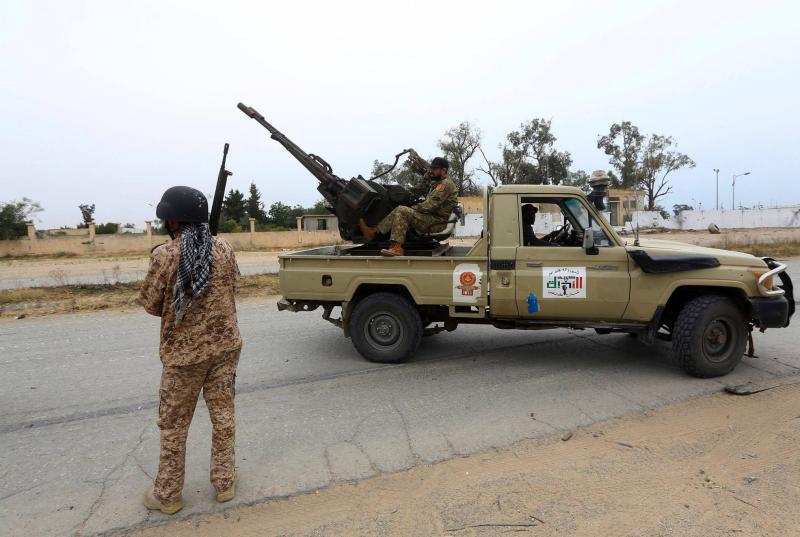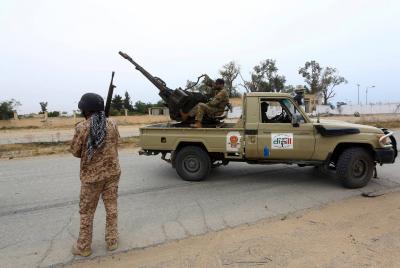Libyan observers and analysts have agreed that the outcomes of the "Berlin 2" conference aimed at resolving the crisis in Libya, which were reached and agreed upon by the participating countries, face numerous challenges, particularly regarding the commitment of local and international parties to implement them. Despite the optimism among the negotiators in Berlin and the comprehensive action plan laid out at this conference to achieve the peace Libya has been missing for over 10 years, it has not provided a complete solution to the crisis, and the path ahead is not clear, according to political analyst Jamal Shakloof.
**Fear of Backtracking**
Shakloof explained in a conversation with "Al Arabiya.net" that the outcomes of the "Berlin 2" conference seem to be good on paper, but there is concern that they might share the fate of the results of the first Berlin conference, which were followed by backtracking. He added that the most important issue now is the implementation mechanisms, especially regarding the withdrawal of foreign troops and mercenaries. He stated that relying solely on converting the outcomes into a UN Security Council resolution is merely another repetition that will be ignored by stakeholders and occupiers who have reservations even about the final communiqué's texts. Additionally, some Libyan parties are merely agents of foreign interests, following orders and implementing them, as he put it. He pointed out that foreign intervention has become the major driving force behind events and decisions in Libya.
**Lack of Implementation Mechanisms**
Political analyst Faraj Farakash also considered that the conference was a push to bring the Libyan file back to the forefront with the goal of reaching a political solution as soon as possible. However, its outcomes lack clear mechanisms for implementation and do not answer the crucial question: "How?". In an interview with "Al Arabiya.net," he noted that the absence of adequate Russian representation could suggest that Russia retains the right to critique and veto any Security Council resolution that reinforces the conclusions from the conference if it feels that this does not align with its interests. Additionally, Turkey's reservations about equating foreign forces with mercenaries give the impression that there is no international consensus on how to withdraw those forces, in light of conflicting interests among these countries.
**Upcoming Elections**
Regarding the upcoming elections and the conference's insistence on the necessity of organizing them on the specified date in December, Farakash stated that "linking the elections to the security climate is directly related to the issue of unifying security and military institutions, which are still stagnant and also need clear mechanisms and international pressure." He considered that resolving the security file is key to stability in the coming phase, as it would expedite national reconciliation efforts and allow for elections to be held in a safe context, transparently and fairly, without threats or extortion amid the proliferation of weapons and armed groups outside state authority.
It is worth noting that Libyan parties still have an opportunity to agree on a constitutional basis for conducting the elections when they meet later this month in Geneva, Switzerland, which seems essential for moving forward with implementing the outcomes of the "Berlin 2" conference.
In this context, political analyst Mohamed Rachis pointed out that the goal of the Berlin conference is to help Libyans organize elections before the end of the current year. However, he viewed that this process faces a contentious issue, even if there is consensus on a constitutional basis, which is the withdrawal of foreign troops and mercenaries, with Turkey holding significant influence, as well as Moscow reducing its representation level at the conference, indicating a prior rejection of its outcomes.
He emphasized in a statement to "Al Arabiya.net" that without resolving the issue of mercenaries and foreign troops and providing mechanisms and tools to monitor the implementation of all the recommendations committed to by both local and international parties, the status quo in Libya will persist, and the results of the conference will not affect the situation in the country.
It is notable that the final communiqué of the "Berlin 2" conference, which took place yesterday, called on the Libyan authorities represented in the Parliament, the Presidential Council, and the Government of National Unity to prepare for presidential and parliamentary elections on December 24, to clarify the constitutional basis for the elections, and to legislate as necessary. Conference participants also emphasized the need to withdraw all foreign troops and mercenaries "without delay," as well as inviting all Libyan parties to fully implement the military agreement "without further delay," in addition to completing the unification of institutions and reforming the security sector, and starting work on a comprehensive national reconciliation process based on rights and transitional justice.




